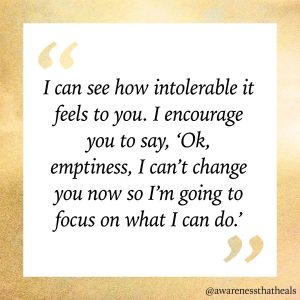While the sound of our friendly mind’s voice varies depending on the circumstances we are facing, it does have abiding qualities. It is either neutral or, when the challenges are not all consuming, it is supportive.
 To demonstrate this, here is the summary of a series of sessions in dialogue form, showing how friendly mind communicated with Jamie, who had been suffering from a melancholy state since he was a child. He had no shortage of good reasons for why he felt this way, as he had a very depressed mother, a lot of pressure to succeed from his father, and a broader family history of depression.
To demonstrate this, here is the summary of a series of sessions in dialogue form, showing how friendly mind communicated with Jamie, who had been suffering from a melancholy state since he was a child. He had no shortage of good reasons for why he felt this way, as he had a very depressed mother, a lot of pressure to succeed from his father, and a broader family history of depression.
FRIENDLY MIND: I can see that you don’t like feeling empty and melancholy—like most everyone else on the planet. What makes it so hard for you now?
JAMIE: I’m tired of having to deal with this so much of the time, and continuously having to experiment with a variety of medications.
FRIENDLY MIND: I know that you have been very diligent in your effort to find the right medications and to do whatever else is possible. This is by far the hardest time: when you’re still actively looking and you haven’t found anything that works. I’m really sorry that you have to go through this, but we both know you’ve done everything that you can do. Right?
JAMIE: Yes, but it sucks to feel this way.
FRIENDLY MIND: I can see how intolerable it feels to you. I encourage you to say, “Ok, emptiness, I can’t change you now so I’m going to focus on what I can do.”
JAMIE: I can see that that would be best, of course. It’s just hard when the depression weighs me down.
FRIENDLY MIND: I recognize it’s hard and that’s why you want to say with as much authority as possible, “It’s hard! I deserve to be kind to myself! I know it’s the most difficult when I’m feeling down and I know I’m doing the best I can right now.”
JAMIE: It seems like I keep forgetting.
FRIENDLY MIND: It’s to be expected, when you’ve been suffering with something for your whole life, that you would need reminders to be patient and compassionate with yourself. Know that it’s a mini-miracle every time you can: remember friendly thoughts when you’re feeling down and be as present as possible.
This dialogue helped bring Jamie to the realization that he had unreasonable hopes and expectations that his chronic low-grade depression would finally leave him. His friendly mind then reminded him that the key was not to try to change his state, but to do his best to tolerate or accept it and then be as totally present with everything else that he was capable of at that point in time. As Jamie implied above, it wasn’t easy, but he persevered, watched himself be able to feel down, be kind with his thoughts toward himself for feeling that way, and still be able to relate to his significant others in a way that showed he was present.
In this series, we take a look at one of the eight key practices for navigating life’s challenges that are explored in my new book, Awareness That Heals. For more, order the book today and receive a 10% new release discount and free shipping.

